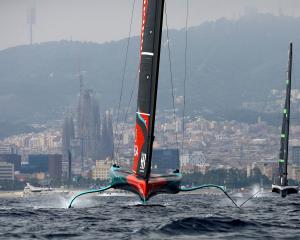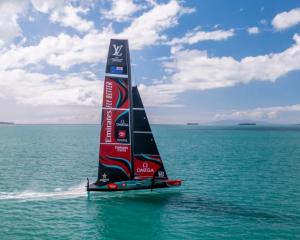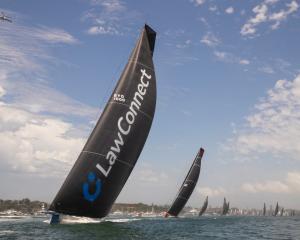
Coutts has done some thinking about the next regatta after being at the forefront of the planning for this one - a bold vision to widen sailing's appeal by using high-speed, hi-tech 72ft (22m) catamarans, racing close to shore and using new broadcast techniques to attract audiences and produce payback for sponsors.
It has come unstuck, attracting only three challengers instead of the expected 15. Coutts blames the economic downturn; critics say the cup budget was still too high - the accepted figure for a competitive team in this regatta is US$100 million ($124 million).
The cup suffered with the capsizes of the Oracle and Artemis boats - the latter taking the life of British sailor Andrew Simpson. This triggered safety concerns that cloaked the event in politics and squabbling.
The racing has also been poor, with the three two-boat races - all between Luna Rossa and Emirates Team NZ - usually a procession, the Italians far behind.
In a wide-ranging interview, Coutts was critical of the Italians, while allowing that Team NZ are the team to beat.
"Team NZ and Luna Rossa are miles apart. I think it has more to do with the talents of each sailing team than anything else.
"I don't want to be too critical of the Italians, but there isn't lot positive you can say about their racing. But Team NZ would beat anyone right now. They have some really good systems on board and good sailors. They are looking pretty polished, the result of having more time on the water than anyone else. They have improved a lot in the last two months and that is what this game is all about."
Coutts thinks the final - which he says will pit Oracle against Team NZ - will bring the racing that people have been expecting from the extremely quick catamarans.
"I think it will be very close," he said. "It is shaping up to be a great race. I always knew that, once Artemis was out, that the challenger series would be one-sided. Obviously having only three challengers is an issue. But I think people will soon see the potential of the event."
Team NZ had done "an incredible job" with their foiling gybes, he said, and were producing some big gains downwind.
Oracle were working hard on several things - including gybes - but "by the time the cup comes round, I think we will be pretty much even in terms of speed".
"It will likely come down to the handling of the boats; the starts will be very important. There's still a lot of work to do and things to learn - things change by the week, I can tell you.
"Everyone is still on a big learning curve. No one has done a lot of racing in AC72s yet. The finals will be very close, much closer than everyone was predicting a year ago."
Coutts is not prepared to go into detail about his thinking on the next regatta if Oracle wins the cup (or, he says, if anyone else wins it).
But he says the basic premise for the holder will be to have more credible challengers, smaller boats, smaller budgets, smaller teams, a cup regatta more often than once every four years (maybe even annually) and a more sustainable financial model.
"I get some people saying to me, 'Well, you'll just have to find another billionaire' - but that is simply not sustainable. I have also heard Grant Dalton say sponsors will come to the party on emotion. I couldn't disagree more.
"Corporates these days - even if the board is full of people who love sailing - can't just sign off massive amounts of sponsorship any more. They need to answer to their shareholders. So in my experience emotion doesn't come into it. They need payback and ratings [exposure in the media benefiting sponsors]."
Coutts last year allowed that Oracle may have made a mistake in plumping for the big catamarans. He said then that, with the considerable advantage of hindsight, the 34th America's Cup could have been raced in boats more like the AC45s - the smaller but still fast and exciting 45ft (13.7m) catamarans used in the build-up event, the America's Cup World Series raced at a series of international venues and won by Oracle.
That would cut down budgets - a bone of contention in this America's Cup. Dalton says Oracle have spent US$250 million and Emirates Team NZ more than US$100 million. Coutts says the two syndicates have spent roughly the same amount.
The boats, he says, take only about 10 per cent of that budget; people costs, up to 60 per cent. So it made sense to move to smaller boats with smaller crews, though Oracle had tried to do that in reducing the crew numbers from the 17 needed to sail the 2007 America's Cup monohulls to the 11 needed for the AC72s.
Only seven are needed for a boat like the AC45.
He says the AC45 costs made up only 1.5 per cent of Oracle's budget. But Oracle's team numbers about 130, including shore crew, design team, support people and administration. That would have to come down.
"But even if we get the budget to US$50 million, that still won't fly in Europe - and money from Europe has been powering the America's Cup in recent times. I think it will be a challenge for the next 10 years."
What would help, he says, are more credible teams and a broadcast package which attracts sponsors so they can meet their corporate needs by getting payback.
Broadcasters in each country would pay to follow their national teams in exciting racing on TV.
That would mean America's Cup-style racing every year, or at least more often than the average of once every four years.
"You can't go into a boardroom and say ... it will be once every four years. They will say, 'so what do we get back for our investment?"'
Coutts says an annual or more frequent series, supported by graphic television will help bring in sponsors. Next month, when more advanced TV coverage of this regatta begins, will give a taste of what he means.
"When the real racing starts - by that I mean the elimination racing - you'll see it. There are features no one has seen yet ... They will be showing you during the races how the currents are acting and things like disturbed wind coming off the boat and what that means."
As well as a compelling broadcast package, Coutts thinks, more credible teams are needed.
"Let's be honest, some of the teams in recent regattas have just been making up the numbers. There have probably been three or four teams that were a bit of a joke."
He cites the first Swiss challenge in Auckland in 2000 as an example.
He rises to get back to work - not much sailing these days for Russell Coutts. He confirms that Oracle are not yet testing their regatta-compliant rudders, still training with the old banned ones.
"If you are changing two things and trying to evaluate both together, it is more difficult than making one change and evaluating that first. A lot of people thought changing the rudders would make us not able to foil; that was ridiculous. Others thought we would be in the sheds for weeks changing the rudders. It'll take a day and a half.
"Anyway, I don't bother much with all that rules stuff. The winner of the America's Cup always has the fastest boat or the best crew or a combination of both. That's what I spend my time on."
- By Paul Lewis in San Francisco












